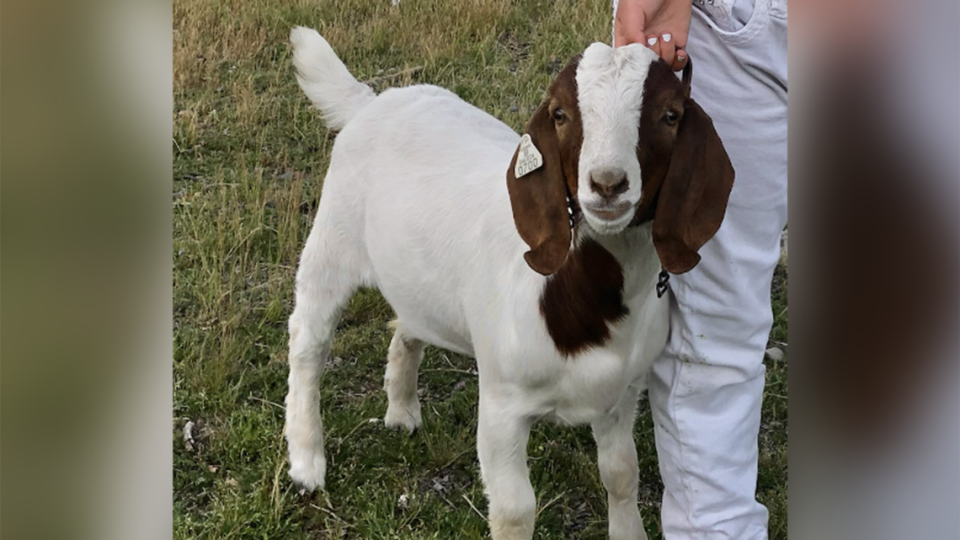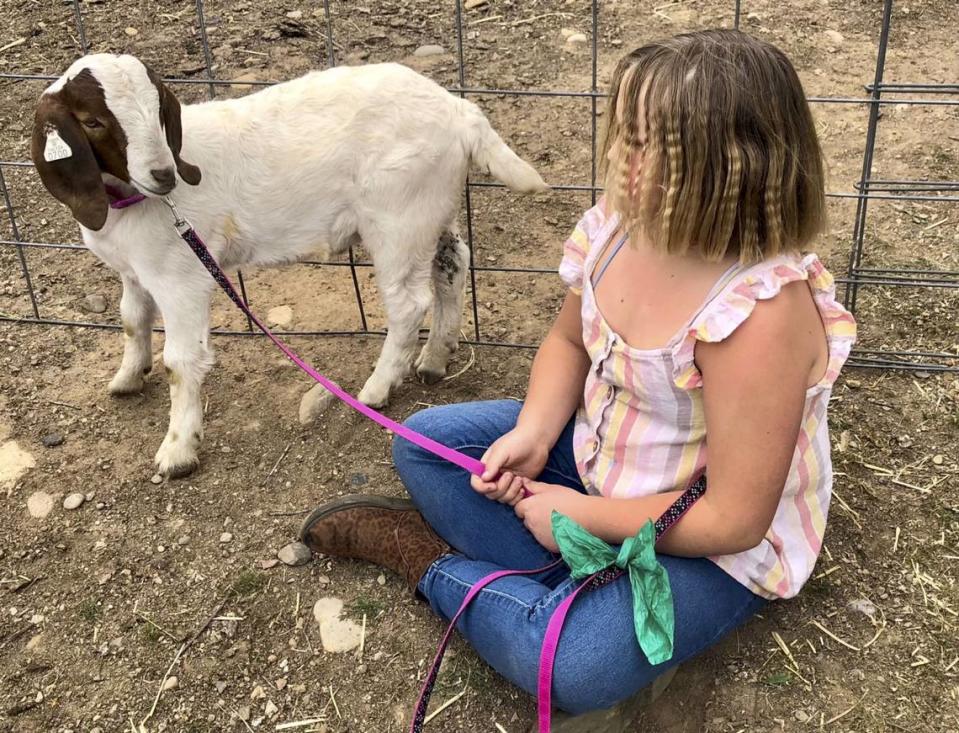Family sues over slaughter of pet goat by Shasta fair. Now, California officials suing them
Seventeen months after Shasta County deputies and fair officials tracked down a 9-year-old girl’s pet goat and had it slaughtered after the girl backed out of a 4-H auction, California Attorney General Rob Bonta’s office is countersuing, placing the blame on the girl’s mother.
In filings in Sacramento federal court Tuesday, Bonta’s office asked for the dismissal of a lawsuit over the seizure of Cedar the goat and said the federal court does not have jurisdiction over the matter.
And, Deputy Attorney General John Bridges argued in a counterclaim, the girl’s mother, Jessica Long, should pay for the defense of the officials she is suing because Long signed an online contract when Cedar was entered into the fair auction.
Under that contract, Long agreed to “defend, indemnify, and hold harmless the fair, the county, and the state of California” for any damage or injury, the court filing says.
“The fair management shall not be responsible,” the contract stated.
“Jessica Long has a duty to defend defendants/counter-claimants as officers, agents, and/or employees of the Shasta County District Fair under the terms of the contract,” according to the court filing, which was made by Bonta’s office on behalf of the California Department of Food and Agriculture and the fair district.
Long’s attorneys, Vanessa Shakib and Ryan Gordon of Advancing Law for Animals, have warned they would file an anti-SLAAP motion and seek attorneys fees if the state countersued, and on Tuesday night they denounced the move by Bonta’s office.
“The state of California and its arm, the Shasta Fair, have again overstepped the boundaries of law and decency,” Gordon wrote in a statement. “They believe they can violate the Constitution and kill a child’s pet goat, and then somehow demand the victims pay them.”

The argument by Bonta’s office is the latest twist in a saga that left the little girl heartbroken and spawned a civil rights suit against fair officials, the deputies who drove hundreds of miles to retrieve the goat and others.
The controversy generated nationwide reaction, including a New York Times column by Nicholas Kristof, debates over the ethics of having children raise pets as meat and an online petition denouncing “the cruel slaughter of Cedar” that had drawn 42,938 signatures as of Wednesday morning.
The saga began in April 2022 when Long purchased Cedar, a 7-month-old white Boer goat with chocolate markings framing its face, for her daughter, who is identified in court papers as “E.L.”
The girl gave the goat his name and fed and cared for him every day. “She loved him as a family pet,” the family lawsuit says.
In June 2022, the family entered Cedar into the Shasta District Fair’s junior livestock auction, an event that ends with the animals being sold off for meat.
But the Long family changed their minds about letting Cedar be sent to slaughter and tried to back out before bidding began. Fair officials refused to allow that, and Cedar was auctioned off for $902.
On the last night of the fair, as the girl was saying a tearful goodbye to Cedar, Long decided to act.
“It was heartbreaking...” Long wrote in an email to the Shasta District Fair later. “The barn was mostly empty and, at the last minute, I decided to break the rules and take the goat that night and deal with the consequences later,” her email read.

Long offered to repay the goat’s buyer and pay the fair for any expenses, but the fair and the California Department of Food and Agriculture, which oversees the state’s 70-plus fairs, said Cedar had to be returned, even after the buyer of the goat agreed to let Cedar go back to the family.
“As a mother, I am not unsympathetic regarding your daughter and her love for her animal,” Shasta District Fair CEO Melanie Silva wrote in an email to Long that was obtained by The Sacramento Bee through a California Public Records Act request.
“Having said that, please understand the fair industry is set up to teach our youth responsibility and for the future generations of ranchers and farmers to learn the process and effort it takes to raise quality meat. Making an exception for you will only teach our youth that they do not have to abide by the rules that are set up for all participants.”
Another fair official, B.J. Macfarlane, texted and called Long and threatened to have her charged with grand theft, the lawsuit says.
Instead of returning the goat to the fair, Long found a home for it at a Sonoma County farm where she envisioned Cedar joining other goats in helping to clear land for fire prevention.
But Long did not count on the persistence of the Shasta County Sheriff’s Office, which obtained a search warrant for a farm sanctuary in Napa County and sent two deputies from Redding to the farm with authorization to break down doors in search of Cedar.
Shasta County sheriff’s Lt. Jerry Fernandez and Detective Jacob Duncan drove more than 200 miles to the Bleating Hearts Farm and Sanctuary to execute the warrant, but discovered Cedar was not there and never had been.
Instead, Cedar was in Sonoma County and the deputies eventually retrieved the goat from that location and returned to Shasta County, spending $190.59 on gas for their mission, according to records obtained by The Bee through a public records request.
Ultimately, Cedar was slaughtered, according to the lawsuit, which seeks actual, general and punitive damages.
But Bonta’s office, which represents fair officials named in the suit, says in its counterclaim that Long is responsible for any injury to her daughter, and that she also must pay to defend the fair officials she is suing because of the contract she signed.
“Jessica Long is therefore bound and obligated to defend, indemnify, and hold harmless defendants/counter-claimants, in whole or in part, from claims, losses, damages, judgment, and settlement expenses incurred or to be incurred in this action by counterclaim,” Bridges wrote.
Long’s attorneys call the AG’s claims “the pinnacle of victim blaming” and say they are an attempt to intimidate her.
“A simple kids club entry form is not carte blanche for government actors to violate the Constitution,” Shakib wrote in an email to The Bee.
Shakib and Gordon maintain that Long had notified the fair in writing that she planned to sue to save Cedar from slaughter, but that the fair went ahead and killed the goat, anyway.
“These baseless counterclaims have one purpose: to intimidate Mrs. Long and her daughter to either drop their case or face a hefty price tag,” Shakib added.

